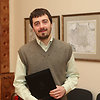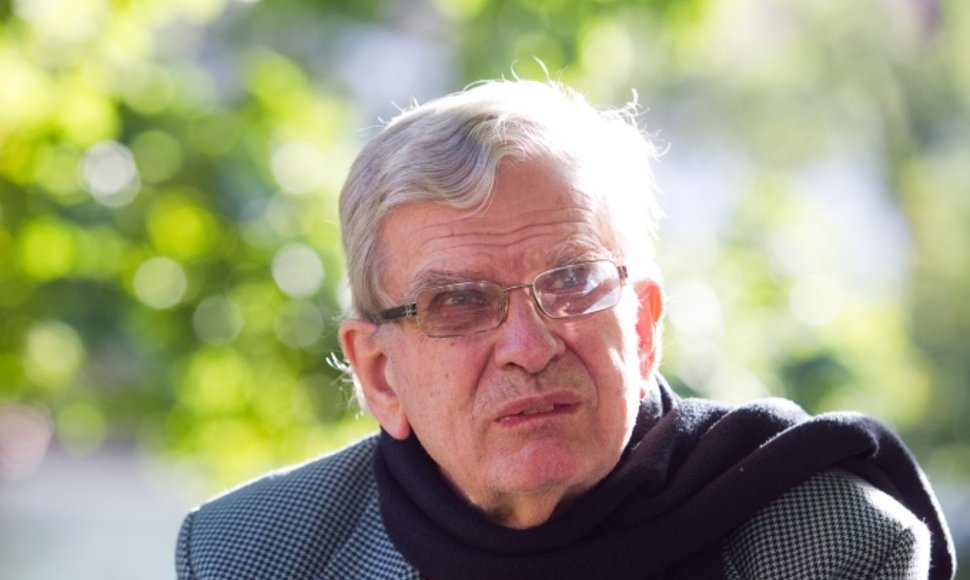Publicist, translator, professor at Yale University, Venclova believes that a free man is a man who seeks truth. The poet sat with 15min on a bench outside St Ann's Church in Vilnius to talk about today's truths and the truth.
- On your anniversary, you've heard many good words about yourself, many congratulations, you were awarded by the Ministry of Culture. But do you truly feel understood in Lithuania? Do you feel you are needed here when you come not on your anniversary?
- I feel like some people need me more and some less, others find me inconvenient, therefore undesirable. I do not think I am an exception in that respect. There are great many people in Lithuania with whom I feel on the same wavelength. These are old friends, some of whom I've know since school, but also a bunch of young people.
- But for the majority of your compatriots, Venclova is a voice of inconvenient truth, someone who is not afraid to sound unpopular. One criticism against you goes something like this: “When he criticizes the way Lithuanians think, attitudes like conformism, he says 'they' and not 'us'.” They say that you look at everything from a distance – as an intellectual probably should – and do not identify yourself with those you observe.
- I think this opinion is wrong. On the contrary, I always try to use pronouns 'us', 'ours'. I am certainly not the only publicist who looks critically at certain problems in Lithuania. I see that my comments are sometimes met with biting reactions, but again, that depends on people – some accept my criticism, others reject. Yes, I'm fully aware of the claims that because I live abroad, I do not understand the situation in Lithuania and therefore cannot comment on it. But to my mind, by looking at it from the outside, at a different angle, one can observe the situation more widely, against the background of history.
Wherever I may life, whatever I may do, I do care about Lithuania. More than any other country on Earth, so that's why I talk about it. One must admit that we have many taboo topics, both historical and social. Most of our intellectuals shun these topics. My position is different – I was not afraid to say what I thought back in the Soviet times, nor am I afraid now.
- What are these topics that we still cannot or dare not name? What should we talk about in today's Lithuania without covering our lips?
- I miss more progress in our relations with Poles, Russians, and Israel. More than that – relations with Poles have even deteriorating lately. Perhaps it is not entirely our fault, but I am of the opinion that each nation should speak about their own mistakes. It is a task for Polish intellectuals to discuss Poles' faults and mistakes – and they actually do it.
We must not be silent about xenophobia, close-mindedness, inclination towards isolationism, nurturing of provincial attitudes. Some of our people have become affluent, but they've kept their bazaar merchant's mentality. We do not have a genuine bourgeoisie of the type they have in France or Germany. We do not have a genuine urban class which is a valuable and indeed indispensable social stratum. In other words, there is no genuine middle class. But there is an abundance of people who care to buy a car, then a better car, and finally several cars, for each of their offspring. Also a house, a summer house on a lake, and finally, if possible, the entire lake.
One Western sociologist has offered an accurate definition of today's man. It's a man who does a job he hates. With money he earns he buys things he can do without. He buys them to impress neighbours he does not like. But he might as well do a job that is less well paid but one that he likes. He can simply not buy things he does not need. He could be friends with neighbours or just ignore them. Another person is not a rival one must surpass at all costs, belittle in order to make oneself feel bigger. Things, running after fashions – something, by the way, that is still done very primitively here – are not what make a man a man.
- The problem of truth. Does it still look fundamental to you, a man of science and art? Perhaps, as years go by, you begin to feel that the answer is receding rather than coming closer?
- The truth does, after all, exist. A free man always looks for it, even though not necessarily finds. From the modern, let alone postmodern, perspective, all things are relative and everyone has his own truth. I am an old-fashion person who thinks that one can tell apart truth and lies. And, if possible, one must do it very clearly. Such was the situation in the Soviet Union. Had someone said back then that the Soviets, too, had their own truth – and I was told just that by some old-generation leftists, like my father and his friends – many people in Lithuania would have booed. Back then, everyone knew very clearly what was true and what was false. All a person had to do was to pick one.
I've said numerous times that many of our national leaders, publicists, and people in general follow three axioms. First, Lithuania and Lithuanians are always right. Second, if Lithuania and Lithuanians are wrong, refer to axiom one. Third, if someone doubts axiom one or two, that someone is on a payroll of the Russian Embassy, Polish Foreign Minister Radek Sikorski, or Simon Wiesenthal Center in Jerusalem. I cannot accept these three axioms. If you follow them, you can be a basketball fan, but not a genuine citizen of your country who must see flaws as well as pluses.
- You've repeatedly stressed that you are first a poet and then a scientist. Have years changed the hierarchy? Do you have more time now to glance back and reflect on the past? Is this how your poetry emerges?
- Poetry is always intimately related to memory. Poetry could even be called a type of memory. Speaking about glancing back, Jean-Paul Sartre put it nicely. A man sees the world like a passenger in the back of a truck, facing away from the driver's cabin. The man only sees the road he leaves behind. The road recedes. And it's impossible to see what's ahead. Therefore literature, history, philosophy are all based on memory.
As for poetry and science, I always try to keep them balanced, something which is not always easy. But if I do remain in people's memory, I'd like to stay through my poems. My interests as a scientist are to do with Slavic studies – I write on Russian and Polish literature. In a year or so, they should publish a big collection of my essays, some of them touching on Lithuanian studies. They published my book on Russian literature several months ago in Moscow. This is what earns my living in America, so I try to be an honest professional. If you make a living in the US, you must abide by the rule “publish or perish.” If you do not have any publications, no one is giving you a job. Though my students say that the law has changed – “publish and perish.” It is extremely difficult to get a job as a philologist these days.
- Speaking about books, do you have any plans of publishing your diaries or memoirs?
- I've been writing a diary every day for the last fifty-odd years. I even managed to take with me what I'd written under Soviets. Doubtlessly, diaries are a sort of historical documents. Extracts could perhaps be published even now, but the full text must probably wait another fifty years. There are still people living, or their children, who would be offended by my open diaries. Like some celebrated poet whom I call a graphomaniac. Or entries like: “Today I met this-and-that drunk as a skunk, ploughing the ground with his nose.” That someone is still walking the streets of Vilnius, perhaps ploughing the ground with his nose a little less often. I do not want to rush with my diaries, even though they will be available and useful to future researchers.
As for memoirs, my translator into English, Ellen Hinsey, is working on a book. It will be a Q&A book in English, perhaps to be translated into other languages later.
- You've written a lot about Vilnius – and not just a guide, but also essays and articles. What do you miss most in this city? I risk to sound sentimental, but are there places that gives you a lamp in your throat?
- In my young days, in the worst moments of my life – and one has a lot of moments like that in one's youth – I would go to St Ann's, St John's, or St Catherine's church and stare at the façades. It would always help. I can still do it today. Sure, I experience fewer bad moments, but the second I raise my eyes to the architecture of Vilnius, my good spirits return.
- What about “Neringa” café?
- It is related to completely different experiences. “Neringa” reminds me of my youth, the friends of my youth.
- I've heard that these friends, upon running out of cash, would leave you as a deposit in the café.
- I would do the same. All sort of things happened in youth.
- How do you feel about many of your friends not being around anymore?
- Yes, many are gone. My close friend Judita Vaičiūnaitė is gone. So is Bronius Savukynas and Zenonas Butkevičius who was an excellent journalist and a great person. Aleksandras Štromas, Vytautas Kavolis, Algirdas Julius Greimas, Joseph Brodsky, Czeslaw Milosz are no longer with us. I start to feel like the last passenger on the Titanic. But there are still close people. I'm very happy that they are still here. God willing, I will pass away before people close to me.



















